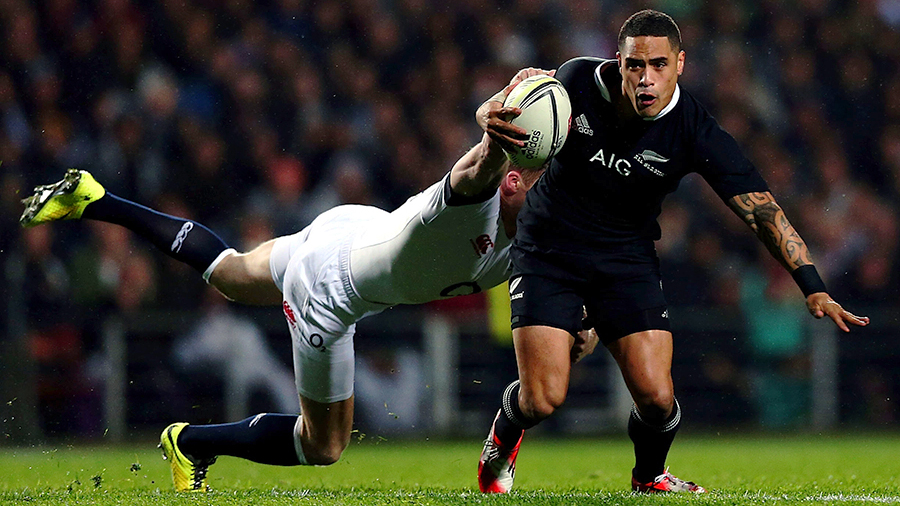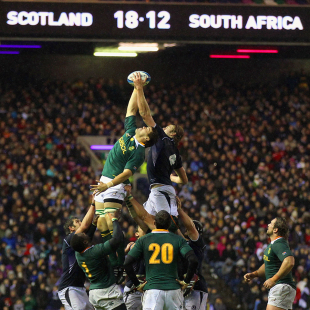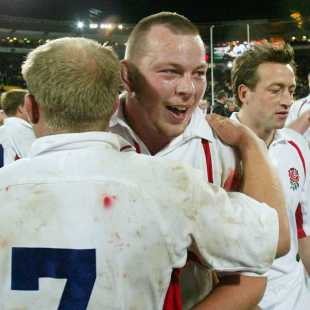|
North v south
The gap is widening
Huw Richards
June 27, 2014

England's impressive displays in defeat against the All Blacks mask a poor record against southern hemisphere opposition © Getty Images
Enlarge
Scots of a biblical bent - and there are still a few, some to be found in rugby club bars - would have very little difficulty in identifying the seasons since the 2007 World Cup with the Book of Genesis's 'seven years of famine'. Scotland have averaged one Six Nations win per season, failed for the first time in 2011 to qualify for the play-off stages of the World Cup and their players have mustered 56 minutes of Test rugby between them across the length of two British Lions tours. Yet in one single respect they have been the best team in Europe over that time. Scotland go into this weekend's Test match against South Africa in Port Elizabeth with the best playing record since the end of 2007 of any northern hemisphere team against the south's three traditional giants. You can argue that this is a statistical freak because Scotland play the southern teams less frequently - 11 times compared to Wales' 25 and England's 23 - than the other traditional European nations and the SANZAR nations may, as Australia did in 2009 at Newcastle, be a little more inclined to field weakened teams. There's also a case to be made that 'best' is a slightly flattering description of a record of three wins in 11 matches. 'Least bad' might be more appropriate.

Scotland enjoyed a win over South Africa in November 2010
© Getty Images
Enlarge
North v south always was one of rugby's fundamental dividing lines, but has become much more salient in recent times. Teams who used to loom out of the southern mists roughly once a decade now turn up on an annual basis. Wales's 20 match losing run against the southern trio has been accumulated in 56 months. It was 64 years between Wales's first match against southern opposition - the All Blacks of 1905 - and their 20th , against Australia in Sydney in 1969. Frequent contact, the southern nations' coalescence into the Tri-Nations in 1995, debates over refereeing and the polemics of writers such as Stephen Jones and Spiro Zavos have made the cross-equator relationship rather more adversarial. And underlying it all is a persistent, and usually justified, northern worry about relative playing standards. The default setting is that the south will be better - and that's not new. The Springboks went 59 years from 1906 between Test-match defeats in Europe. The All Blacks first visited in 1905 and lost one match out of 123 in Ireland, Scotland and England between then and their loss to North-West Counties 1972. The migration of Australia from also-ran to serious third force in the 1980s reinforced the pattern. It is a perpetual source of rugby debate, the more so as World Cups loom into sight. Hence one Sky host's comment, the weekend before last, that the north v south balance was getting more and more competitive. It was a way to introduce discussion and also a natural response to a morning which had seen England produce a second successive decent display against the All Blacks and France, albeit in a match so bad that one seasoned neutral observer reckoned the best entertainment was fans throwing paper aeroplanes from one of the stands, holding Australia to a six-point margin.
And if we take only the period since the last World Cup, the gap appears still wider. Here the southern lead is 37 to 4, with a single draw, in percentage terms an 89-11 superiority. Stuart Lancaster's England are more competitive than Martin Johnson's, but still have only two wins and a draw from 11 matches. For the rest the picture is worse - France one win from nine, Scotland one from six, Ireland winless in six and Wales nil from ten. And there is a clear regression from the previous seven year (2001 to 2007) period. These were, by comparison, years of plenty. Of 101 matches, the Europeans won 28 and drew three. The greatest single factor in this is the record of Clive Woodward's England, who won nine consecutive matches against the southern trio between the start of 2001 and their World Cup final win in November 2003. But even if we take that unmatched effort out, the south's percentage superiority (70 wins to 19, three draws) is still 'only' 76-24. England did better, even in the anticlimactic years after 2003, than they have since 2008 - winning four matches out of 17. France won nine in 24, including five wins and a draw in eight matches against South Africa, while Ireland won four times in 16 matches. The striking difference between this period and the years since 2008 is that both Australia and South Africa were comparatively vulnerable to the stronger European teams - Australia were 13-13 against England, France and Ireland in this period compared to 15-1-5 since 2008, while the Springboks were 9-1-12 compared to a more recent record of 9-1-2.

England earned a rare victory over the All Blacks in New Zealand in 2003
© Getty Images
Enlarge
Certain elements have remained constant through the last 21 years. One is the remorseless excellence of the All Blacks, with 80 wins and two draws in 89 matches, a winning percentage of 91 against Europe's best teams. It makes those defeats - by France twice in New Zealand in 1994, then at the 1999 and 2007 World Cups and by England against John Mitchell's experimental team in 2002, in the match of the six-man scrum at Wellington in 2003 and Twickenham in 2012 - truly memorable. The other constant has been the haplessness of Wales, with only two victories - against the Boks in 1999 and the Wallabies in 2008 - and a 29-29 draw with the Wallabies in 2006 to set against 53 defeats, a losing percentage of 96. So the answer to any suggestion that the gap is closing is a reasonably clear 'no'. The southern hemisphere's statistical edge grows still more overwhelming and where South Africa and Australia were once comparatively vulnerable to the stronger European teams, they now usually put them away. South Africa's winning percentages over the three seven-year periods have been consecutively 67, 61 and 87% while Australia have run at 78, 64 and 75%. Irish and Scottish victories have been intermittent, with the exception of Ireland's successes against the Boks and Wallabies in the dying years of the old Lansdowne Road ground. France have regressed consistently - from 67% to 42, then 14 over the last seven years. Perhaps most striking has been the inability of two coaches who have transformed their teams' fortunes in Europe to convert this progress into victories over the south. The extraordinary run of failures by Warren Gatland's Wales scarcely needs elaborating, but Stuart Lancaster's England have more than an echo. Lancaster's England have won four out of five matches in each of the last three Six Nations seasons - comfortably their best run since the Woodward days. Yet their record against the southern trio compares unfavourably not only with the unworldly achievements of the Woodward era, but that achieved under Andy Robinson (three wins in nine). Both have produced teams who can give the southern hemisphere trio a serious contest. And there are certainly circumstances in which a close-run-thing can be a serious marker of progress. But as both would certainly agree from bitter experience, there has to come a point where near misses start turning into victories. That the best current European teams cannot in these terms match their counterparts from the recent past suggests that the gap, if anything, is widening. And it will take more than a Scottish victory in Port Elizabeth to shift the balance the other way. © ESPN Sports Media Ltd
| |||||||||||||||
Live Sports
Communication error please reload the page.
-
Football
-
Cricket
-
Rugby
-
- Days
- Hrs
- Mins
- Secs
F1 - Abu Dhabi GP
Abu Dhabi Grand Prix December 11-131. Max Verstappen ()
2. Valtteri Bottas (Mercedes)
3. Lewis Hamilton (Mercedes)
4. Alexander Albon ()
5. Lando Norris ()
6. Carlos Sainz Jr ()
-
ESPNOtherLive >>
Golf - Houston Open
Snooker - China Open
Tennis - Miami Open

